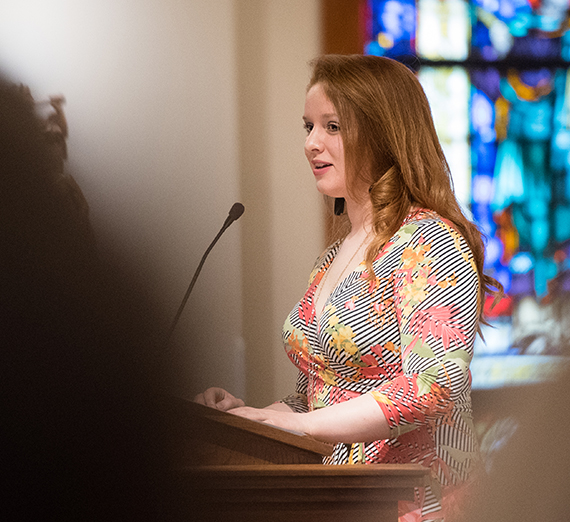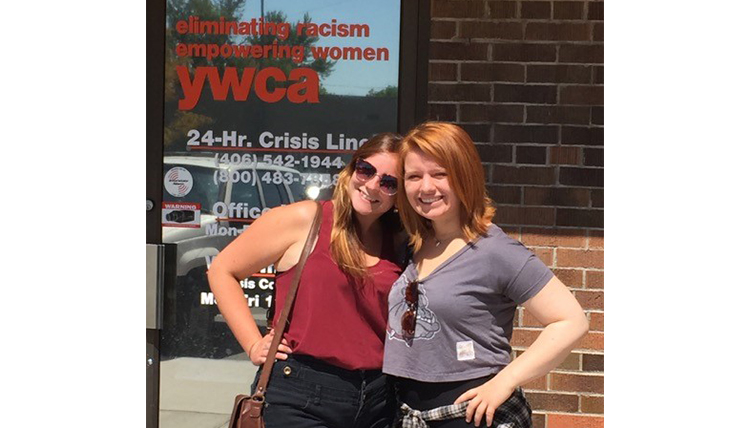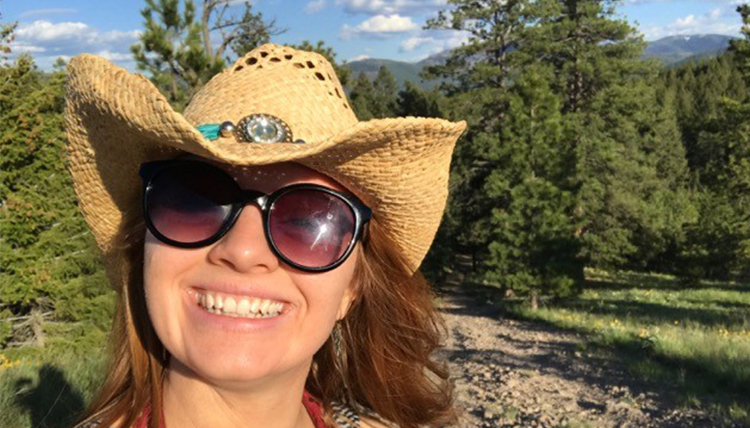Stronger Than You Know

[Editor’s Note] Thirty-three graduates of the class of 2018 are taking assignments as volunteers in three foreign countries and 20 U.S. cities: Nine of them will move to inner-city schools and mentor youth considered to be on the fringes, through Teach for America; 10 are partnering with Jesuit Volunteer Corps; many have chosen Peace Corps, AmeriCorps, Mercy Volunteer Corps and other similar organizations. All were celebrated by the Center for Community Engagement (formerly CCASL), which fosters students' interests for immersion and service opportunities. The keynote speaker at the Social Justice Missioning was 2016 grad Olivia Schneider, who served with Jesuit Volunteer Corps at a YWCA women’s crisis center in Missoula, Montana, before beginning her career in Portland. Here is her message.
By Olivia (“Liv”) Scheider (’16)
I’ve been trying to think of the perfect thing to tell you about my year as an advocate to survivors of domestic violence, in Missoula, Montana. What I wanted to hear at my own missioning ceremony conflicts with what I want to share with you.
The truth is, I struggled greatly during my year as a Jesuit Volunteer. I was relieved when it ended, and yet I never doubted or regretted my reasons for saying, “yes,” to a year of service. No matter how dark things got, I could always feel rays of light peaking through, reminding me that the world I was living in was not good or bad, but every shade in between. I’ve realized that some of the toughest moments from my own service journey may seem scary to the listener, but they are reflections of the pieces of the goodness nurtured inside of me from a time of challenge. I am excited to share with you the beauty and breaking of my time as an advocate to survivors of domestic violence because it was a year of self-empowerment.
During my first month in Missoula, I felt culture shock. Just two states away from the territories I’d lived most of my life and I was completely out of my element. I didn’t expect to feel this way, staying in the Pacific Northwest. New house, new job, new way of life, new group of people who were supposed to be my new friends and coworkers…I looked around and there was very little familiarity to grab onto. At GU the idea of “leaning into the discomfort” was a familiar concept to me, but this was more than leaning in. This was pushing ahead into uncharted territory, cautious and hopeful. You may be feeling this way now about your decision. It’s absolutely expected that you will feel overwhelmed at the beginning of your service journey. You are immersing yourself in the unknown, which comes with some growing pains. Be patient with yourself. Give yourself the room to figure things out and catch your breath; grant permission to be kind to yourself in this time of transition.
Part of my stress when I began at the YWCA came from realizing the learning curve to becoming an advocate for survivors of domestic violence was steep. I kept trying to remind myself the mantra Jesuit Volunteer Corps had told us at orientation:
“You may feel under qualified for your role, but you are fully capable.”
The evening after my first night of service, I sat alone in my new room. I didn’t have sheets yet, there was nothing on the walls, I was sore from biking all over town to meet community partners, and I was catching on to the fact we would be eating bread, cheese, and eggs for most of our meals. It hit me all at once that this was more than a week with Mission: Possible, this was my life now, and I felt instant panic because I would be living like this for 11 more months. “You may feel under qualified for your role, but you are fully capable.”
Then I felt shame. I thought, This is only day 1 and I am so privileged that I can shelve my privilege for a year to live simply, be a social worker of sorts, and try to understand what the people I’m serving are feeling. And then I can go back to the life I’d lived for 22 years, because that is the elasticity of my status. While I would be sacrificing many things to uphold social justice, I was also stepping into social issues with intact privileges that could create a natural barrier for me in my work. However, you will also find your service sites to welcome you, privilege and all, because there is so much we can learn from each other. Wrestling with the concept of privilege is healthy to explore, in relation to your area of service.
Over the next few months, the Y quickly embraced me and my community mate, Cat. Cat worked with kids, and I with women living at the Y’s shelter. Our roles, I thought, were to help survivors of domestic violence feel empowered to leave their abusers. I quickly learned helping someone leave abuse and start over was much more rare, and that the real goal of our work was to keep someone fleeing violence alive for the duration of their stay with us.
During my third month with the Y, the newness had worn off, and I was starting to feel the effects of providing daily service. I noticed I was perceiving my work to be like that of a first aid kit—putting one Band-Aid on at a time, hoping it would be enough. My work had me spending most of my time at the shelter, providing case management, in person crisis counseling, and coordinating wrap around services for women wanting to relocate and begin living independently.
There was no greater feeling than hearing a survivor tell you they wanted to live a life without physically and emotionally inflicted pain, and that they could build themselves up on their own.
One of my favorite letters a resident wrote to our staff reads, “What we need is more people who specialize in the impossible. It looks like there are endless choices that I am now capable of making. I’ve been able to explore what I enjoy again, what makes me happy, and it’s amazing. Without a doubt you [all] have shown me how to live again, and be okay doing it. I want to live and feel I am worthy.”
Notes like these made all the hard work feel much easier. You will make positive impact in your positions.
Before I knew it, my work began to evolve. By months four and five, I felt I was becoming much more competent and that I was actually making small changes that were significant to some individuals, but I was also dealing with compassion fatigue. I sought out counseling for myself, I began pushing myself to do things outside of my house and service. Cat and I started volunteering at the local movie theater, I went on hikes with my community, I camped, I bought a cowgirl hat at the thrift store and went to the Sunrise Saloon with my new friends; I started listening to country music and drinking my coffee black, and best of all I started liking these things. I started getting into a groove. This separation began to help me process what I was doing and nourish those parts of myself that had been depleting in my efforts to live simply. Providing service every day can be emotionally and physically taxing. It’s important to recharge yourself so that you can be better for others.
My job also had me answering the 24-hour crisis line. Sometimes I would meet people at the hospital after they had fled their homes, to assess them for a short term shelter stay. People were relieved and occasionally surprised when I told them, “I believe you,” because they had been told so many times by their abusers they would never find someone to validate their hidden truth. In our service work, we are called to hold the stories of our communities with respect. There is no greater service than being present for someone when they share their truth.
In months 6, 7, and 8 I developed a passion for engaging with the legal system. I loved attending court and imagining how laws could be more supportive of survivors. I offered to help residents with their Child Protective Services cases. Many survivors would tell me they felt alone; share stories of pain they had no idea anyone else had experienced. One of my greatest moments last year was when a woman I had been working with for a couple months told me that she felt safe when she worked with me. I was proud that my role was helping someone feel seen, safe, and deserving.
The survivors I’ve worked with are my heroes, the strongest people I have ever met. In my last months I stopped worrying so much about my privilege and just felt immense joy to be privileged enough to bare witness to the stories of these survivors. July came, and I felt sadness to leave my team of advocates, my friends, but I knew it was also time and that I couldn’t continue my work with the Y. I was as confident about leaving JVC as I was about entering the program. Throughout my year, I learned to trust in myself and in the belief that all would be well in time. I felt under pressure during my experience as and advocate, but facing challenge is what guided me toward compassion. I would remind myself at times, that diamonds are made from the same intense heat like I was feeling. I know frustration would form me into a better person. I was determined to emerge shiny, multi-faceted, and a bit sparkly.
Returning home to Portland I have been processing my service as a JV and feeling more confident. I still occasionally answer the Missoula crisis line, and it’s a great way for me to stay connected with my team and friends at the Y, as well as continue my service. I am also using my advocacy skills with an agency called Cupcake Girls, which strives to create non-judgmental support and security for sex industry workers. Though challenging, heartbreaking, brilliant, joyous, and exhausting, I have emerged from my experience of post-grad service proud of myself and stronger for my trials. Social Justice work has always been at the core of my being, and for a year it got to be my main focus. I am grateful a year of service is now part of the fabric of who I am. My work with the Y has directly served me in becoming a more understanding, cognizant, passionate woman.
I have for each of you being missioned today, a copy of my favorite quote, which gave me comfort in Missoula. It reads:
“There is beauty in the breaking and strength in the sorrow.”
I hope it reminds you to keep the challenges of your own service year in perspective.“There is beauty in the breaking and strength in the sorrow.”
As you begin on your own journey, know you have the support of this community at your back the entire way. Should you need encouragement, reach out to this support system surrounding you.
Congratulations on taking the path that is a little overgrown, wandering, and steep.
You are stronger than you know.


